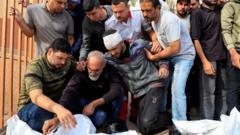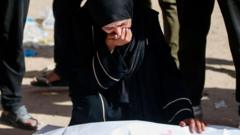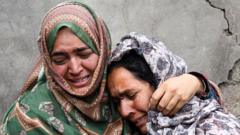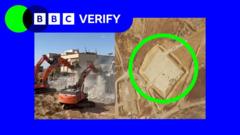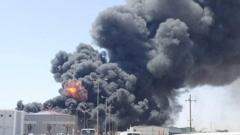Reports from Gaza reveal the heartbreaking plight of families, especially children like six-year-old Ismail, who face hunger and trauma as food and medical supplies become increasingly scarce amidst intensified military operations and a total blockade.
"Desperation in Gaza: Children Go to Bed Hungry Amid Blockade"
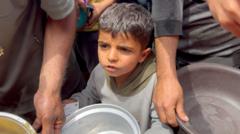
"Desperation in Gaza: Children Go to Bed Hungry Amid Blockade"
Overwhelming struggles in Gaza as families face acute hunger and medical shortages due to the ongoing blockade and military actions.
In northern Gaza, six-year-old Ismail Abu Odeh was seen desperately vying for food at a distribution point, pleading, "Give me some." Although he managed to fill his bowl with lentils, it was soon knocked from his grasp, leaving him in tears as he returned to his family’s tent. The next day, no food or water arrived at the displacement camp where Ismail resides, leading to further anguish as empty bowls and bottles littered the area.
As Israel escalates its military actions and maintains a comprehensive blockade on essential supplies, the situation in Gaza continues to deteriorate. The United Nations and other organizations have raised alarms about the imminent risk of famine in the enclave. Nevertheless, the Israeli government asserts that food is not lacking in Gaza, attributing shortages to Hamas's alleged flouting and misallocation of aid. They suggest that the current cessation of aid serves as a pressure tactic against Hamas, which currently holds 58 hostages, with some believed alive.
Communication with Gaza has been severely restricted for journalists, relying on telephone conversations and trusted local freelancers. Interviews conducted over the past two days reveal widespread struggles to secure even one meal each day as charities cease operations and food prices skyrocket.
A manager of one of the few remaining food kitchens reported operating on a precarious day-to-day basis with limited resources, while another volunteer lamented the disastrous shutdown of their kitchen due to empty shelves, nurturing feelings of helplessness among the community.
Young adults like 23-year-old Rewaa Mohsen in northern Gaza confide that persistent dizziness and fatigue from hunger have become normalized, as many families resort to creative alternatives to feed themselves. Adham al-Batrawi, displaced from al-Zahra, shared innovative methods to concoct meals from scarce ingredients, but still feels energy-deficient and worried about his family's survival.
In Deir al-Balah, nurse Rewaa Mohsen faces increasing difficulty ensuring her young daughters have basic necessities, fearing the rapid depletion of her supplies while managing the constant backdrop of bombing sounds. She managed to stockpile some essentials during earlier ceasefire periods, but her limited resources are quickly running out.
Hospital staff also bear the brunt of the blockade’s impact, with insufficient medical supplies exacerbated by Israeli airstrikes targeting medical facilities. Nurse Randa Saied recounted her experience during a recent strike while working at the European Hospital, an event that left her feeling vulnerable yet determined to care for patients.
The U.S. is reportedly preparing a new plan to deliver humanitarian aid through private entities in response to the crisis, though the UN has voiced concerns over potential manipulation of this aid. Back in Gaza City, the emotional toll on families continues to mount, with Ismail's father expressing his despair over his children's hunger, stating, "Sometimes I sit and cry like a little kid if I don't manage to provide food for them."


